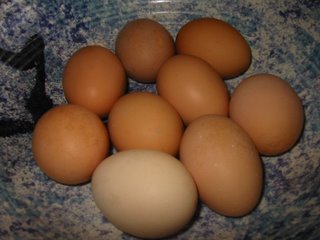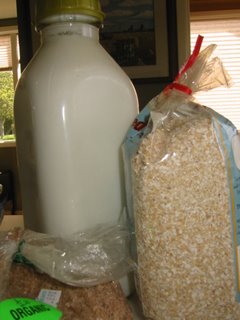 I heard on a CBC radio interview that Home Economics is rarely taught in schools anymore. It was one of those subjects that, when I was in school, was mandatory for girls. Then, long after I was out of school, it became a subject that boys took as well.
I heard on a CBC radio interview that Home Economics is rarely taught in schools anymore. It was one of those subjects that, when I was in school, was mandatory for girls. Then, long after I was out of school, it became a subject that boys took as well.And we learned what the kitchen was all about, from tools that are used to ingredients for basic meals. Home Ec also included a sewing class...the less said about that part the better for me. I was not a seamstress.
But I remember Miss White, the cooking teacher. She was an older (she seemed older, at the time, anyway...I was only about 14 and everyone over twenty seemed very old) European teacher who believed in stern measures when she taught us to cook. Everything was graded; the way the towel was hung up after the class was done, the neatness of the work area, spotless dishes...more time was spent on cleaning up after her previous to us second-year class than actual cookery in the first year. Cleaning and learning to measure and which pan or pot to use were also taught. It was Boot Camp for future cooks, and it was mandatory in the curriculum.
In the second year of Home Economics, we actually cooked and baked. Friends would wait outside the classroom door when the lesson was over for the tasting. Teenagers are always ravenous and we were no exception. We learned to bake muffins, biscuits, cookies and cakes, so second year Home Ec students were always popular. I still remember walking to a friend's home after school, where we demolished two cakes we had just baked in class, eating the still warm concoction with gusto. I don't remember if anything I've ever tasted since was that good.
My love of impeccably prepared food, something my mother did everyday, and my understanding of it, definitely peaked at that moment. And my journey into the cookery world began.
With Miss White's One Egg Cake.
When I cook, when I bake, it is with utter total concentration as to what I am putting into the batter, sauce or marinade. I believe freshness of the ingredients is the key to all things successfully turned out of the kitchen. When I cook, it is with my mother's voice in mind telling me to clean as I go, putting ingredients and tools away or in the sink. With Miss White in mind, I know which tools to use...and how to substitute if something isn't available.
These two teachers' lessons taught me to cook creatively and intuitively. They taught me that mistakes are inevitable; two or three similar errors would not be tolerated, however. They taught me to learn from my mistakes. Quickly. Slothful thinking was not allowed in the kitchen.

In the second year of Home Economics, I learned that when I cooked something I liked, the recipe turned out much better than when I wasn't drawn to the ingredients. I learned passion was an ingredient...if it wasn't there, the food I made turned out lackluster. That passion and love, learned way back then, became an ingredient I still try to infuse into almost every meal I make.
These lessons have an impact on my whole life. I try and clean the detritus of past mistakes as I go, I try to learn from them so as not to repeat them, I try to be creative and intuitive and fruitful, while allowing fresh opportunities to flourish...and I try to be passionate and loving in every area of my life.
Pretty good lessons learned from cooking classes that, in this day, are not considered mandatory. Those classes, whether we loved or disliked them, instilled within us the knowledge and discipline required to take care of ourselves...without processed, fast food and a microwave oven. Those classes taught me what to look for when ingredients are acquired; the freshness of the vegetables (the term organic was not used way back then), eggs, meat and fish, and dairy products was considered uppermost, in Miss White's mind. She passed that mindset on to me.
In honour of Miss White...here is her One Egg Cake recipe. It really is good, basic with lots of room for additions and experimentation. This is one of those recipes where you remember the ingredients without needing a book. And you can bake it as muffins, or even in a pie shell. This one is baked in a loaf pan.
1 1/2 cups all purpose flour
1/2 tablespoon baking powder
1 tsp. baking soda
1/2 tsp. salt
1/4 cup butter, softened slightly
1/4 cup (up to half a cup, if you want it sweeter) sugar
1 cup 5% buttermilk
Combine flour, baking powder and soda, and salt in a bowl. In another bowl, cream (we had to cream by hand, but you can use a mixer...) the butter and sugar together. It should be light, fluffy and almost white in colour when you're through. This stage seemed to take a very long time when I was young. My arms almost fell off after beating, beating, beating...with Miss White insisting there was still not the right consistency of the fluffiness or colour.
Stir in the egg and mix well. Stir in the buttermilk; add the dry ingredients qvvickly! as Miss White would say, and stir for just a leedle minute.
Spoon the batter into a greased pan and bake at 350 degrees, until it's done. Really. We had to stand by the stove, and wait till the aroma wafted out, at which point we would take a toothpick and "test" for doneness. If batter clung to the toothpick, 5 more minutes baking time would be required, at which point we had to test again. After doing this exercise enough times we soon learned about how long something would take in the oven without having a timer or clock.
But if you bake it for about 40 minutes, depending on what you've added to the basic ingredients, you should be alright, but test (!) to make sure. Miss White had stock in the toothpick manufacturing companies, I feel sure.
It's a good cake to experiment and be creative with, because no matter what you do to this recipe, as long as the basics are there, it is really good...even if the whole thing is an entire failure. I feel sure that is why Miss White had us learn it so well. Her students would always eat it however it turned out, and they were sure to remember a recipe which satisfied even the pickiest among us.

If our kids don't have Home Economics, it becomes harder to find the knowledge needed to approach a kitchen without fear. A couple of years of cooking basics can set up a youngster who is ready to leave home, taking away the fear of the vegetable and the ingredient aisles in the grocery stores.
Once they've cooked something from scratch for themselves, those processed, packaged and fast foods are sure to lose their glory. The sense of well-being a cooked from scratch meal brings is incomparable to a box of dried pasta and a seasoned powder.
Something to think about.
No comments:
Post a Comment